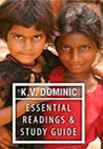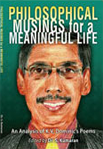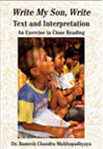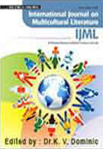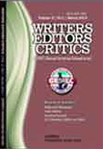Details of Critical study
Drops of Honeydew: A Critical Analysis of T. Vasudeva Reddy’s Gliding Ripples
Year Of Publish:
Review Article
Drops of Honeydew: A Critical Analysis of T. Vasudeva Reddy’s Gliding Ripples
K. V. Dominic
(Appeared in IJML 3.1 (January 2013)
I have been fortunate to edit several books on contemporary Indian poets in English and thus could assess all the leading poets actively engaged in writing now. Prof. T. Vasudeva Reddy (Prof. T. V. Reddy) twinkles like a unique star among the great contemporary Indian poets in English and deserves a place very close to Prof. Jayanta Mahapatra, the best English poet in the country now. It is really tragic and ironical that Prof. Reddy is less read and studied by his own compatriots than the poetry lovers abroad. The awards and honorary DLit he was conferred from the West approves this fact. The established money-minded publishers of the country, Sahitya academies and educational departments of the Centre and the States, curriculum committees of universities, colleges and schools are all responsible for the discrimination and negligence shown to Indian writers in English and particularly to contemporary poets. English being the global language, the literature in this language about a nation, its people, their ways of life, philosophies, myths, traditions, ethos, cultures, landscapes, climates etc. should rationally get a preference to literatures in regional languages. But most unfortunately the Indian scenario is different.
Prof. T. V. Reddy, poet, novelist and critic has authored six collections of poems entitled When Grief Rains (1982), The Broken Rhythms (1987), The Fleeting Bubbles (1989), Melting Melodies (1994), Pensive Memories (2005) and Gliding Ripples (2008). What makes him distinct from other contemporary poets is that he is a meeting point of the past and the new—conventional, structured, rhymed poetry and the present, unrhymed free verse. He started writing English poems as retaliation to the outputs of some of the so-called leading English poets in the country. Poetic composition was indeed a laborious task to him and his poems were born with much travail. Rhythm in his poems is as musical as ripples of a brook. I have found very seldom poets among the contemporary English poets who use rhymes so natural and sensible to the lines. He in fact reminds me to leading Romantic and Victorian poets with regard to his lyrical qualities–craft of rhymes, assonance and alliteration, and use of imagery. Prof. Reddy is a rural poet, portraying the beauties of his village–landscape, flora and fauna, innocent people, animals and birds etc. Since he shifts his life from village to town very often, we find also urban scenes and their beauties in some of his poems. Being a social critic, there are many poems which are satirical and lampoons that bring out the hypocrisy and parasite mentality of politicians. Prof. Reddy, spiritual and pious to the core, have written some excellent poems dealing with metaphysical and philosophical themes. Using very simple vocabulary, he conquers the minds of the readers and allures them to voyage through his poems, one after the other till the end of the book.
Gliding Ripples is his latest collection published in 2008. It is divided into two parts—Part I Mainstream and Part II Haiku Stream. The Mainstream consists of fifty seven lyrics and the haiku stream, 102 haiku. Since this paper has its own spatial limitations I am constrained to focus only on a few poems.
The opening poem in the book, “Erase the Borders” is an exquisite poem in which the poet reminds the readers that boundaries exist only in minds. According to the poet, borders are products of blind theories.
Boundaries exist only in mind
whipped up by theories blind;
Let us not race for winning runs,
in one voice wipe out killing guns; (Gliding Ripples 11)
See the fine imagery of cricket and war which the poet has brought out in these lines. The rhymes add beauty and rhythm to the lines.
“What is there for Pride” is a charming poem which proclaims that human pride is the cause of all fall. “When Fate summons depart we must, / All this parading power goes to dust.” (Gliding Ripples 12)
“Mortuary of Books” is an excellent poem which is highly relevant at this cyber age. Books are castaway untouchables. They fail to seduce cold eunuchs.
Let the long forgotten fallen angels
wake up from torpor and resurrect,
break the fetters and regain the Paradise; (Gliding Ripples 14)
“Idols for the Idle” depicts the changes in mental attitudes and thoughts as one grows from a child to a grown up man. The poet makes a self analysis of his life in this fascinating poem. As a student he was fascinated by the legendary and historical idols like Sri Ram, Krishna, the Buddha, Christ, Kabir, Asoka, Akbar, Napoleon, Lincoln, Tilak, Gandhi etc. But when he grew up to the nuclear age
Alas! Old idols lost their light and lustre;
later I grew up to this Nuclear age
which has led to the primitive stage
with dilution and pollution of culture,
political revolutions to rob and grab,
education to the liquidation of ethics;
Crazy idle brains worship false Gods
and install in the sanctum matinee idols; (Gliding Ripples 16)
“Countryside” is a touching poem which portrays the hard realities of the present countryside.
once a sylvan scene
now sick with no sheen,
once rich venal bloom
now only deepening gloom. (Gliding Ripples 19)
This poem is a perfect piece of antithesis with fine rhythm and rhyme contrasting the ancient, innocent countryside to the doomed modern.
“Our Bureaucrat” is a lovely satire on the corrupt government employees.
Heavy with choking scent his imported car
races like a shooting star to the Blue Moon bar,
with hurried steps he enters the spacious hall
amid cabaret dance, lights and lively ball; (Gliding Ripples 22)
“Time Spares None” is an enticing philosophic poem which reminds us that Time is a great leveler, and virtue will be rewarded and vice punished at the fullness of time.
a dictator or a cruel tyrant
with all his power and rant
cannot escape the gallows
when Higher Justice bellows. (Gliding Ripples 27)
“Before They Pour” is another brilliant philosophic poem pointing out the cause of all effects—both physical and metaphysical.
Without the union of Adam and Eve
neither creation nor procreation,
neither life to feel nor divine bliss;
Without the inspiring call
neither a moving poem
nor a slice of creative art. (Gliding Ripples 36)
The thought-provoking poem “Greedy Man” reveals that man is the only animal on earth brooding greed till he reaches his grave.
But this man knows no content or rest,
yearns to earn and earn till he is laid to rest,
. . . . . . . . . . . . . . . . . . . . . . . . . . . . .
Though the end needs six by two on a full run
he craves for all the land under the sun. (Gliding Ripples 37)
“This Theatre” is yet another grand philosophical poem comparing the world to a huge stge. Even mighty kings and tyrants can’t leave their signatures immortal here.
Lions and leaders vanished untraced,
their names unknown as times raced;
Now clowns and crooks lead the land,
rob and share the booty wielding wand
and bury traces of ethics fathoms deep
with their foul and gory acts in full sweep. (Gliding Ripples 38)
“The Rose” is a fine nature poem bringing out the beauty of rose flower and how it serves others with its presence. It also ponders on the tragic fate of the flower when it is withered and dried. It is metaphoric to human beings also when they become old and burdensome.
My presence is a source of joy
even for a lifeless idol or wooden toy,
To all I spread full fragrant light,
even flinty hearts I fill with delight;
. . . . . . . . . . . . . . . . . . . . . . . . . .
All the petals, withered and trampled still,
found their cemetery atop the dunghill. (Gliding Ripples 41)
“Donkey” is an admirable poem attributing majesty, honour and pride to the humble, ill treated animal.
He wishes his master to bow and kneel
and dreams to conquer the unkind humans,
who always beat his tribe, whip and peel,
with his regal mercy steeped in patience. (Gliding Ripples 42)
“Melting Dream” is a fine pensive poem on the poet’s spouse, how she filled happiness in his life and how her untimely demise brought gloom and darkness to his life.
Soon with ease transformed our abode
to a Paradise of conjugal love, an ode,
into a singing nestling vernal nest
free from pricks, in delight to rest,
a lovely blooming bower of Eden
fragrant with blossoming garden;
. . . . . . . . . . . . . . . . . . . . . . . . . . .
Is life really worth living? A puzzle!
Eyes without light of life or lustre
only to see ashes of bony cluster,
waiting to reach with a humble bow
the quiet Nirvana of deathless love;
a lingering lyric of unfading pain,
a pensive echo of the lyrical strain. (Gliding Ripples 47)
“Endless Night” is a superb poem delineating the contrast of life and death in one’s organs as one dies.
The hands that fed
so many starving stomachs
and rocked the infant cradles
are now cold, tied by time; (Gliding Ripples 48)
“A Mother’s Cry” is a very touching poem written in rhymed quatrains. The agony of a mother in losing her son who went for fishing in the sea is portrayed here.
Why do you tear and burn my womb
and hide my only son in your hungry womb?
Swallow me; spare my son and send him back,
mourned his mother till her heart did crack. (Gliding Ripples 60)
The poem ends with the climax of grief:
Her blank eyes stared at the blue expanse,
for days and days she stood with no response
till that stormy eve when the roaring wave
took her to meet her son in the watery grave. (Gliding Ripples 60)
“My Humble Prayer” is the last poem of the mainstream in which the poet pleads to the Creator to make him sensitive and receptive to the beauties of Nature as well as to eternal values.
Bless me, a poor soul, if you have grace
in thy unseen all-embracing cosmic heart,
to see the priceless treasure of mother’s love,
to suck the ecstasy of love of the loving wife,
to enjoy the blissful joy of the child’s smile,
to feel the rhythm of the rustling leaves,
of the caressing breeze and the singing bird,
. . . . . . . . . . . . . . . . . . . . . . . . . . . . . . . . . . .
to swallow the deafening sound of thunder
and suck to the lees the thrill of the rainbow, (Gliding Ripples 79)
Part II Haiku Stream of the book contains one hundred well crafted haiku. Prof. Reddy doesn’t stick to the conventional syllabic pattern of 5-7-5. Haiku contains a kigo, or seasonal reference, and a kireji or verbal caesura, i.e., pause or break after each metrical phrase. The use of verbal caesura to bring out contrast or comparison is visible in Prof. Reddy’s haiku. Here are a few samples to evaluate his deft in haiku:
Beads of dew at dawn
on blades of grass on lawn—
Pearls in a string. (Gliding Ripples 84)
Know the roots
of hair and hair dye,
before you die. (Gliding Ripples 88)
Clock on the tower
barks every hour—
crowds busy with their graves. (Gliding Ripples 93)
One tender smile
lights many a mile,
eases an uphill task. (Gliding Ripples 94)
May be because of the scope of haiku is limited that I am more allured and bewitched by Prof Reddy’s lyrics than his haiku. Let me wind up this article exhorting the lovers of English poetry to get a copy of this book and voyage on its ripples. I assure you sublime delight and enlightenment.
Work Cited
Reddy, T. Vasudeva. Gliding Ripples. Baltimore: Publish America, 2008. Print.

